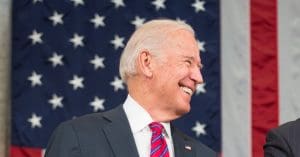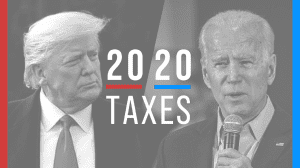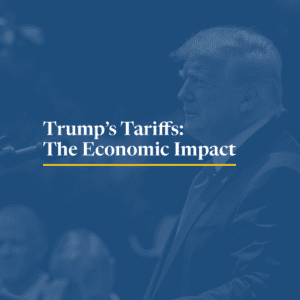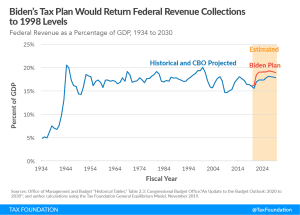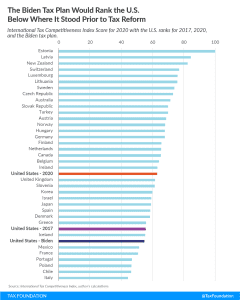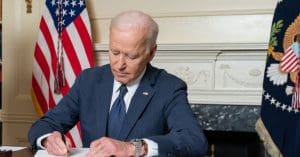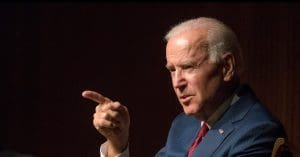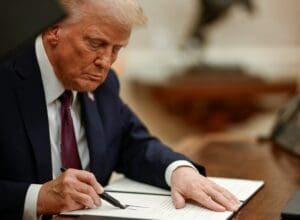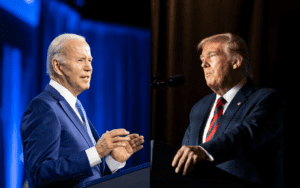Modeling of Democratic Campaign Plans
Wealth Tax Proposal Estimates
Wealth taxes on ultra-wealthy households have been proposed by Democratic presidential candidates to fight against inequality and raise extra revenue but there is substantial uncertainty about how much revenue can be raised.
Comparing wealth taxes to income taxes shows how seemingly low rates on wealth equate to high income tax rates. Wealth taxes in European countries have had disappointing results and many have been phased out. A wealth tax would face serious administrative and compliance challenges due to valuation difficulties and tax evasion and avoidance issues.
A wealth tax would also induce foreign inflows of hundreds of billions of dollars a year to replace reductions in U.S. savings, which would cause international investors to replace home-grown billionaires as owners of capital.
See Full Wealth tax estimate
Summary of Wealth Tax Proposal Estimates
|
Sen. Sanders (I-VT) |
Sen. Warren (D-MA) |
| Conventional Revenue, 2020-2029 (Billions) |
$3,261 |
$2,636 |
| Dynamic Revenue, 2020-2029 (Billions) |
$2,555 |
$2,193 |
| Gross Domestic Product (GDP) |
-0.43% |
-0.37% |
| Gross National Product (GNP) |
-1.65% |
-1.15% |
| Capital Stock |
-0.81% |
-0.69% |
| Wealth |
-10.21% |
-7.19% |
| Source: Tax Foundation General Equilibrium Model |
Corporate Tax Proposal Estimates
2020 Democratic presidential candidates have proposed various changes to the corporate income tax to raise revenue for their policy proposals.
This includes increasing the corporate income tax rate, ranging from 25 percent to 35 percent, imposing a corporate surtax or a minimum tax, and lengthening depreciation schedules.
The effect of each of these proposals will be to increase the cost of capital in the United States, making it more expensive for businesses to make productivity-enhancing investments, and by doing so, reduce economic output, wages, and employment.
See Full Corporate tax estimate
Summary of Corporate Tax Proposal Estimates
|
Fmr. Vice President Biden (D) |
Fmr. Mayor Bloomberg (D) |
Fmr. Mayor Buttigieg (D) |
Sen. Klobuchar (D-MN) |
Sen. Sanders (I-VT) |
Sen. Warren (D-MA) |
| Plan Details |
28% corporate income tax rate and 15% minimum tax on book income |
28% corporate income tax rate |
35% corporate income tax rate |
25% corporate income tax rate* |
35% corporate income tax rate and economic depreciation for all investments |
35% corporate income tax rate and 7% surtax on book income |
| Static Revenue, 2020-2029 (Billions) |
$1,553 |
$1,253 |
$2,507 |
$716 |
$3,871 |
$3,379 |
| Dynamic Revenue, 2020-2029 (Billions) |
1,351 |
1,093 |
2,149 |
629 |
2,689 |
2,683 |
| Gross Domestic Product (GDP) |
-1.20% |
-1.00% |
-2.10% |
-0.50% |
-3.80% |
-3.70% |
| Capital Stock |
-2.90% |
-2.30% |
-5.10% |
-1.30% |
-9.10% |
-8.70% |
| Wage Rate |
-1.00% |
-0.80% |
-1.80% |
-0.40% |
-3.20% |
-3.10% |
| Full-time Equivalent Jobs |
-236,000 |
-187,000 |
-413,000 |
-103,000 |
-755,000 |
-722,000 |
| *Sen. Klobuchar has proposed a variety of corporate tax rate increases, ranging from 25 percent to fund infrastructure improvements, 27 percent to fund deficit reduction, and 28 percent to fund child care and paid family leave, and has mentioned in debates that she would repeal the Tax Cuts and Jobs Act corporate tax rate. |
| Source: Tax Foundation General Equilibrium Model, November 2019. |
Payroll Tax Proposal Estimates
2020 Democratic presidential candidates have proposed various payroll tax changes to raise revenue and maintain solvency for major federal programs.
This includes levying Social Security payroll taxes on taxpayers with high wages, raising the Social Security payroll tax rate, and enacting new payroll taxes to fund new federal programs.
Each proposed change to payroll taxes levied on wages would make the tax code more progressive but would also reduce after-tax incomes for most wage earners. This is because employees fully bear the economic burden of payroll taxes, lowering the incentive to work and reducing economic output.
See Full Payroll tax estimate
Summary of Payroll Tax Proposal Estimates
|
Fmr. Vice President Biden (D) |
Fmr. Mayor Buttigieg (D) |
Sen. Klobuchar (D-MN) |
Sen. Sanders (I-VT) |
Sen. Warren (D-MA) |
| Plan Details |
12.4% Social Security payroll tax on wages above $400,000 |
12.4% Social Security payroll tax on wages above $250,000 |
12.4% Social Security payroll tax on wages above $250,000 |
7.5% payroll tax on employers with a $2 million payroll exemption and 12.4% Social Security payroll tax on wages above $250,000 |
14.8%Social Security payroll tax on wages above $250,000 |
| Conventional Revenue, 2021-2030 (Billions) |
$808 |
$1,556 |
$1,556 |
$5,505 |
$1,890 |
| Dynamic Revenue, 2021-2030 (Billions) |
$657 |
$1,302 |
$1,302 |
$4,677 |
$1,573 |
| Gross Domestic Product (GDP) |
-0.28% |
-0.36% |
-0.36% |
-1.17% |
-0.41% |
| Capital Stock |
-0.33% |
-0.42% |
-0.42% |
-1.33% |
-0.48% |
| Full-time Equivalent Jobs |
-350,400 |
-462,500 |
-462,500 |
-1,570,000 |
-532,500 |
| Source: Tax Foundation General Equilibrium Model, November 2019. |
Individual Income Tax Proposal Estimates
The major 2020 Democratic presidential candidates have each proposed changes to the individual income tax, one of the largest sources of federal revenue.
These proposals range from raising the top marginal income tax rate to 39.6 percent, imposing surtaxes on labor and investment income, and repealing provisions of the Tax Cuts and Jobs Act (TCJA).
See Full Individual Income tax estimate
Summary of Individual Income Tax Proposal Estimates
|
Biden |
Sanders |
| Plan Details |
Raise 37% tax bracket rate to 39.6% |
Impose a 52% tax rate on incomes over $10 million, impose a 4% income-based premium on all income, repeal the Section 199A pass-through deduction |
| Conventional Revenue, 2020-2029 (Billions of Dollars) |
$109.00 |
$3,168.40 |
| Dynamic Revenue, 2020-2029 (Billions of Dollars) |
$84.00 |
$2,169.50 |
| Gross Domestic Product (GDP) |
0% |
-2.04% |
| Capital Stock |
0% |
-2.54% |
| Full-time Equivalent Jobs |
0 |
-1,532,000 |
| Source: Tax Foundation General Equilibrium Model, November 2019. |
Capital Gains Tax Proposal Estimates
See Full Capital Gains tax estimate
Summary of Capital Gains Tax Proposal Estimates
|
Biden |
Sanders |
| Plan Details |
Repeal step-up in basis. Raise capital gains taxes to ordinary income rates for those with >$ 1 million |
Raise capital gains taxes to ordinary income rates for those with >$250,000. Institute a 4 percent income premium on capital gains |
| Conventional Revenue, 2020-2029 (Billions of Dollars |
$451 |
$28 |
| Dynamic Revenue, 2020-2029 (Billions of Dollars) |
$418 |
($10) |
| Gross Domestic Product (GDP) |
-0.03% |
-0.07% |
| Gross National Product (GNP) |
-0.21% |
-0.20% |
| Capital Stock |
-0.02% |
-0.08% |
| Full-time Equivalent jobs |
-400 |
-41,000 |
| Source: Tax Foundation General Equilibrium Model, November 2019. |
